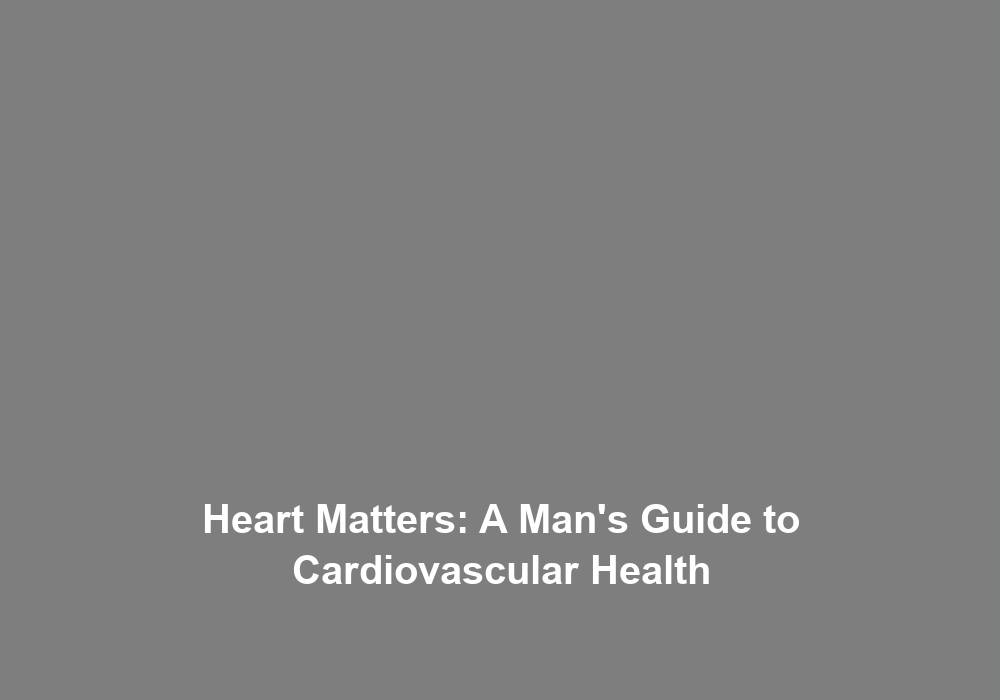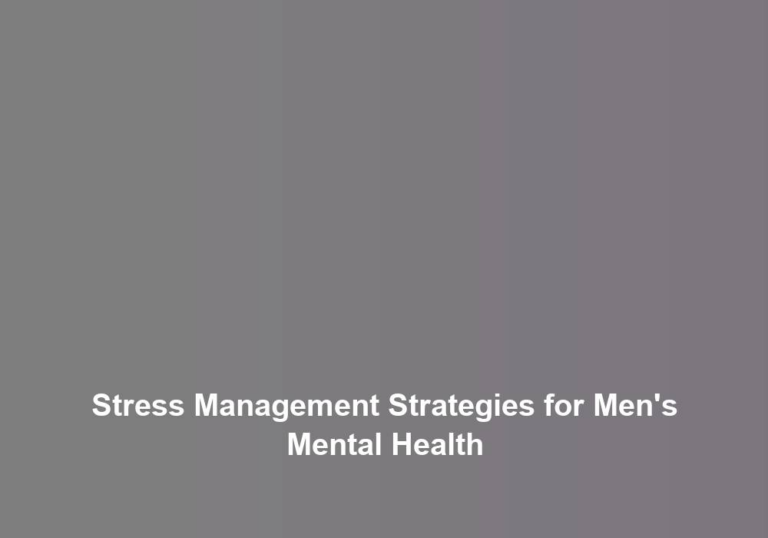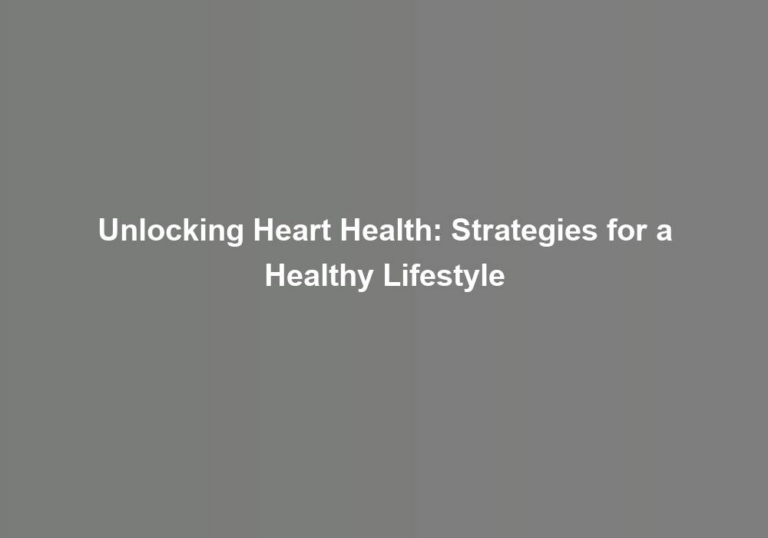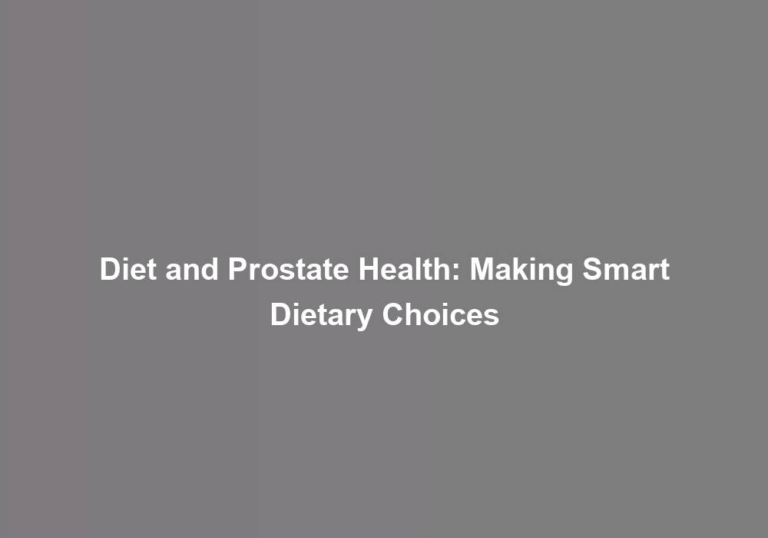Heart Matters: A Man’s Guide to Cardiovascular Health
You may have heard the phrase G??broken heartG?? used to describe the emotional pain of loss or heartache, but did you know that it can also apply to the physical state of your heart? Your heart is the engine that keeps your body running, and just like any well-oiled machine, it needs regular maintenance to function at its best. When it comes to menG??s health, cardiovascular well-being is often overlooked until a serious issue arises. But what if there were simple steps you could take to ensure your heart stays strong and healthy? If youG??re interested in learning how to take control of your cardiovascular health and make informed decisions, then youG??ll want to explore the insights and practical tips in this guide.
Understanding MenG??s Heart Health
Understanding menG??s heart health begins with recognizing the unique risk factors and symptoms that can impact cardiovascular well-being. As a man, itG??s crucial to be aware of the warning signs that could indicate potential heart issues. Symptoms such as chest pain, shortness of breath, fatigue, dizziness, and irregular heartbeats should not be ignored. While these symptoms can be attributed to various conditions, itG??s essential to seek medical attention if you experience any of them, as they could be indicative of underlying heart problems.
In addition to symptoms awareness, prevention strategies play a pivotal role in maintaining heart health. As a man, itG??s important to adopt a heart-healthy lifestyle by incorporating regular exercise, a balanced diet, maintaining a healthy weight, managing stress, and avoiding tobacco and excessive alcohol consumption. Regular health check-ups and screenings are also vital for early detection and prevention of heart-related issues.
Moreover, being informed about treatment options and the recovery process is essential. In the event of a cardiovascular issue, understanding the available treatments, such as medications, surgeries, or cardiac rehabilitation, can aid in making well-informed decisions. Furthermore, knowing about the recovery process and the steps involved in regaining optimal heart health is crucial for a successful recovery journey.
Risk Factors for Men
Recognizing the unique risk factors and symptoms that impact cardiovascular well-being is essential for men to proactively manage their heart health. As a man, understanding the specific risk factors that can affect your heart is crucial in taking charge of your cardiovascular well-being.
Here are three key risk factors for men to consider in maintaining a healthy heart:
-
Diet Modifications: Making significant changes to your diet can have a profound impact on your heart health. Focus on consuming a variety of nutrient-dense foods such as fruits, vegetables, whole grains, lean proteins, and healthy fats. Limit your intake of saturated and trans fats, sodium, and added sugars. Incorporating heart-healthy foods and minimizing those that are detrimental to cardiovascular health can significantly reduce your risk of heart disease.
-
Smoking Cessation: If you are a smoker, quitting is one of the most important steps you can take to improve your heart health. Smoking damages the blood vessels, increases the buildup of plaque in the arteries, and raises the risk of blood clots. By quitting smoking, you can significantly lower your risk of heart disease and other cardiovascular conditions. Seek support from healthcare professionals, join smoking cessation programs, or use nicotine replacement therapies to help you quit for good.
Understanding and addressing these risk factors through diet modifications and smoking cessation can significantly reduce your risk of heart disease and contribute to your overall cardiovascular well-being.
Healthy Lifestyle Choices
Making informed choices about your daily habits is crucial for maintaining optimal cardiovascular health and reducing your risk of heart disease. Dietary habits play a significant role in your heart health. Aim for a diet rich in fruits, vegetables, whole grains, lean proteins, and healthy fats. Limit your intake of saturated fats, trans fats, cholesterol, and sodium. Incorporating heart-healthy foods like salmon, walnuts, and olive oil can also benefit your cardiovascular system.
Smoking cessation is non-negotiable for a healthy heart. If you smoke, take proactive steps to quit. Smoking damages the blood vessels, reduces the oxygen in your blood, and increases the formation of blood clots, all of which elevate your risk of heart disease. Seek support from healthcare professionals or smoking cessation programs to help you successfully kick the habit.
Maintaining a healthy weight is vital for your heart health. Excess weight strains the heart, raises blood pressure, and contributes to high cholesterol levels. Aim for a balanced diet and regular physical activity to achieve and sustain a healthy weight.
Moderation is key when it comes to alcohol consumption. While some studies suggest that moderate alcohol intake may have cardiovascular benefits, excessive drinking can lead to high blood pressure, heart failure, and even stroke. If you choose to drink, do so in moderation: up to one drink per day for non-pregnant women and up to two drinks per day for men. Always consult your healthcare provider to determine what level of alcohol consumption is safe for you.
Exercise for Heart Health
To maintain optimal cardiovascular health and reduce the risk of heart disease, incorporating regular exercise into your routine is essential. Exercise not only strengthens the heart and improves circulation but also helps manage weight, lower blood pressure, and reduce the risk of developing diabetes. When it comes to exercise for heart health, consider the following key points:
-
Aerobic Workouts and Weight Training: Engaging in regular aerobic workouts, such as brisk walking, cycling, swimming, or running, can significantly improve cardiovascular health. Aim for at least 150 minutes of moderate-intensity aerobic exercise per week. Additionally, incorporating weight training into your routine helps build muscle strength, which in turn can improve heart health and metabolism.
-
High-Intensity Interval and Low-Impact Exercises: High-intensity interval training (HIIT) involves short bursts of intense exercise followed by brief periods of rest or lower-intensity activity. This type of exercise has been shown to improve cardiovascular fitness and overall heart health. On the other hand, low-impact exercises like yoga, tai chi, or using elliptical machines can provide a gentle yet effective way to improve cardiovascular function without putting excessive stress on the joints.
Stress Management Tips
When managing stress for improved cardiovascular health, incorporating relaxation techniques such as deep breathing and meditation can be beneficial. Mindfulness techniques, including meditation and deep breathing, have been shown to lower blood pressure, reduce stress hormones, and improve overall heart health. Engaging in deep breathing exercises for just a few minutes a day can help activate the bodyG??s relaxation response, leading to a decrease in heart rate and blood pressure. Similarly, meditation has been linked to reduced stress and anxiety, which can in turn benefit cardiovascular health.
In addition to mindfulness techniques, finding activities that bring you joy and relaxation can also be effective in managing stress. Engaging in hobbies, spending time with loved ones, or simply taking a nature walk can all contribute to stress reduction. Regular physical activity, such as walking, swimming, or yoga, can also be beneficial for both the mind and the heart. Exercise not only helps to alleviate stress but also improves overall cardiovascular function.
ItG??s important to remember that managing stress is a crucial part of maintaining heart health. By incorporating relaxation techniques, mindfulness practices, and enjoyable activities into your daily routine, you can effectively manage stress and support your cardiovascular well-being. Always consult with a healthcare professional to develop a personalized plan that suits your individual needs and health goals.
Importance of Regular Check-ups
Regular check-ups are essential for monitoring and maintaining your cardiovascular health. By incorporating preventative care and early detection, regular doctor visits and health screenings play a critical role in managing your heart health.
-
Preventative Care: Regular check-ups allow healthcare professionals to assess your risk factors for cardiovascular disease and provide guidance on lifestyle modifications. By addressing issues such as high blood pressure, high cholesterol, and diabetes early on, you can significantly reduce your risk of developing heart-related complications.
-
Early Detection: Health screenings during check-ups can detect potential heart problems, such as irregular heart rhythms or structural abnormalities, before they escalate into more serious conditions. Identifying these issues early provides an opportunity for timely intervention and management, ultimately reducing the likelihood of heart attacks or strokes.
-
Doctor Visits: Establishing a consistent relationship with a healthcare provider through regular check-ups enables you to discuss any concerns or symptoms related to your heart health. Your doctor can provide personalized recommendations and treatment plans, ensuring that you are proactive in maintaining a healthy heart.
Conclusion
So, gentlemen, are you ready to take charge of your heart health? By understanding the risk factors, making healthy lifestyle choices, staying active, managing stress, and scheduling regular check-ups, you can significantly reduce your risk of heart disease. ItG??s time to prioritize your cardiovascular health and make the necessary changes to ensure a long, healthy life. Are you up for the challenge? Your heart is counting on you.







